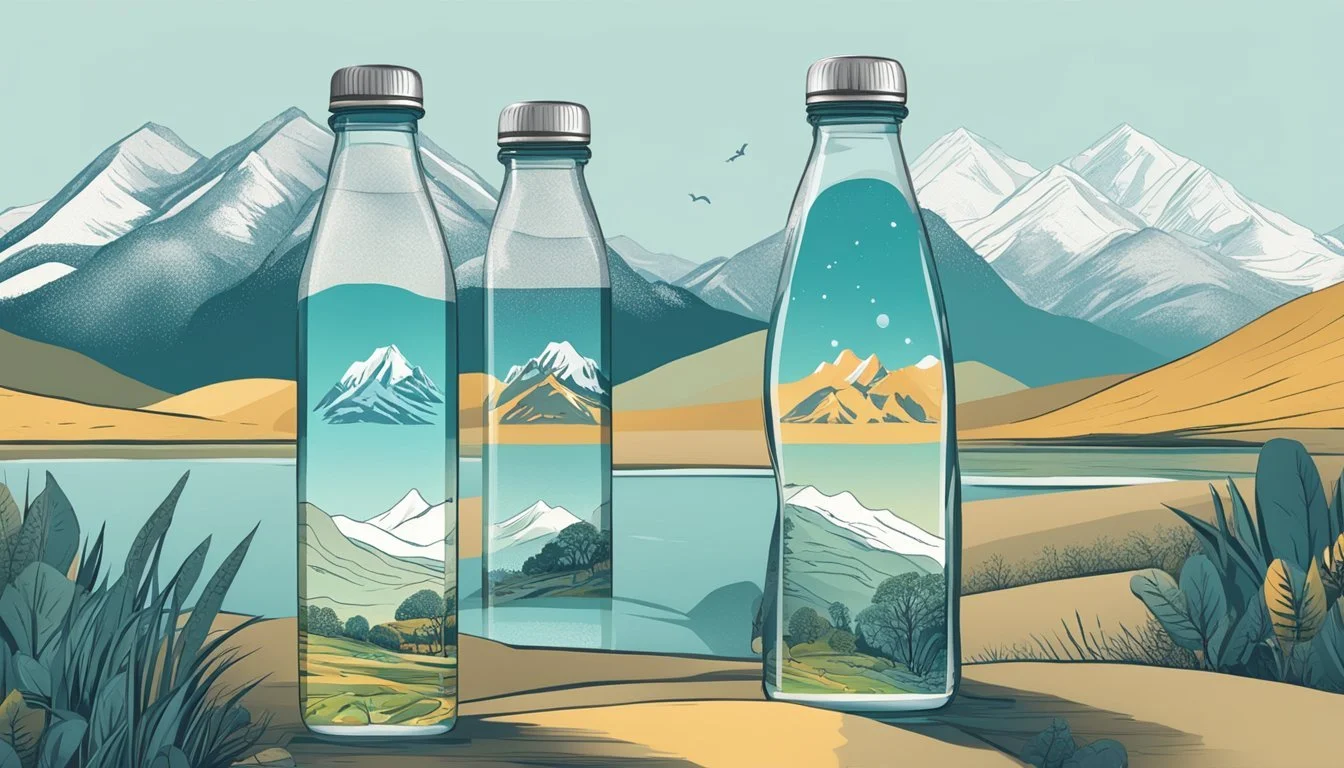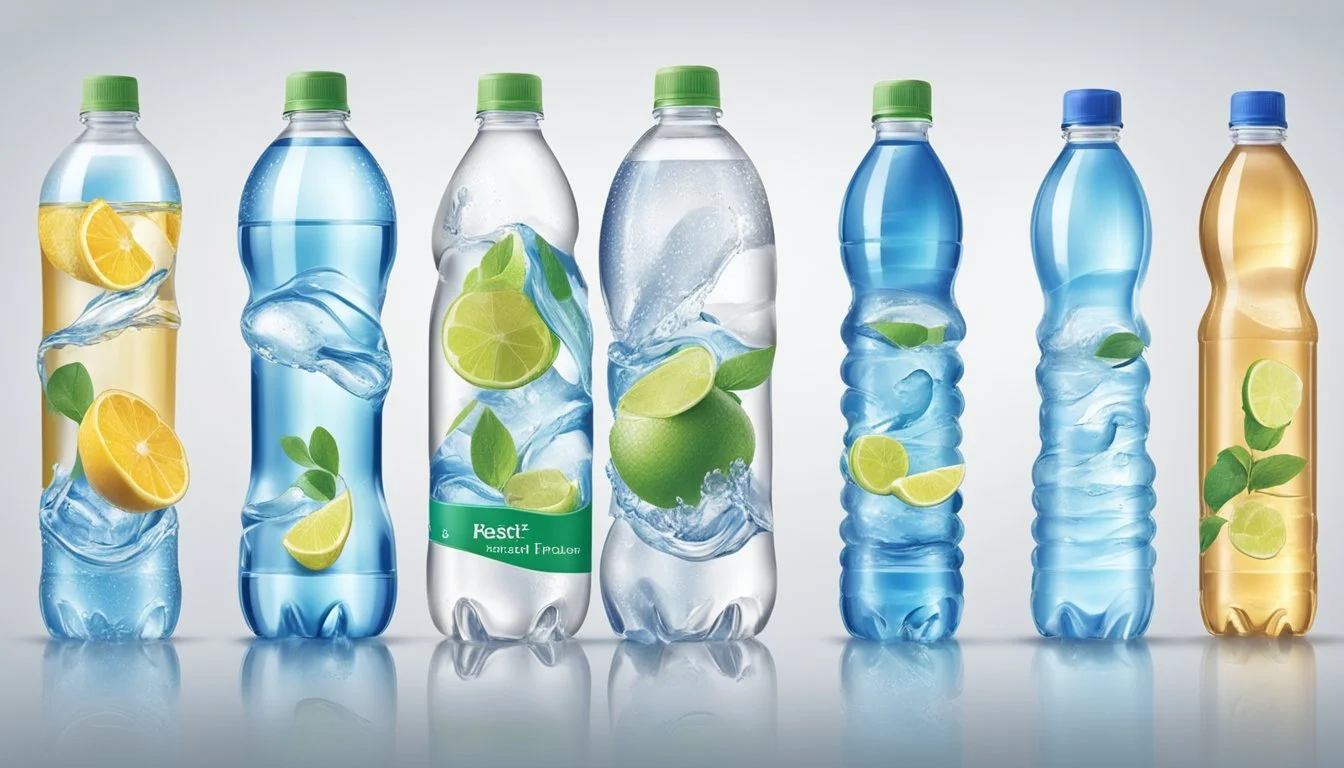Flow vs. Mananalu
Comparing Bottled Water Quality and Sustainability
When it comes to choosing between Flow and Mananalu bottled water, consumers face a decision between two environmentally conscious brands. Flow offers naturally alkaline spring water sourced from carefully selected sites in the U.S. and Canada, packaged in paper-based cartons. The brand promotes sustainability with its use of renewable materials and low carbon footprint.
Mananalu, founded by actor Jason Momoa, aims to eliminate single-use plastic bottles by providing purified water in 100% recyclable aluminum cans. The brand's mission-driven approach centers on environmental sustainability, making it an attractive option for eco-conscious buyers. In terms of sustainability, Mananalu's use of aluminum cans potentially offers an edge due to their high durability and refillability.
For those prioritizing taste and health benefits, Flow's naturally alkaline water, with its smooth texture and subtle mineral taste, stands out. Meanwhile, Mananalu offers clean purified water with the convenience of being widely available online and in stores. Each brand caters to different consumer preferences, making the choice between Flow and Mananalu a matter of balancing environmental impact with personal taste and convenience.
Overview of Brand Origins
Mananalu was founded by actor and ocean activist Jason Momoa. After his role as Aquaman, Momoa channeled his passion for the ocean into combating the issue of single-use plastics. Mananalu, which is bottled in 100 percent recyclable aluminum cans, aims to reduce plastic waste. The brand is widely available, including online through Amazon and physical stores like Whole Foods and Safeway.
Flow, on the other hand, is a company known for its premium alkaline spring water. The brand places a strong emphasis on sustainable practices, using responsible sourcing and eco-friendly packaging. Flow is also famous for its distinctive, plant-based Tetra Pak containers that preserve the quality of the water while minimizing environmental impact. Their products are available in various retail stores and online platforms.
Both brands emphasize sustainability and have distinct approaches toward environmental responsibility. Mananalu focuses on eliminating plastic through the use of aluminum cans, while Flow uses plant-based packaging to achieve its ecological goals. These brands reflect growing consumer demand for eco-conscious choices in the bottled water market.
Environmental Commitment and Sustainability
Both Flow and Mananalu are renowned for their strong environmental commitments and sustainability efforts. These initiatives are crucial to addressing environmental concerns and reducing carbon footprints.
Eco-Friendly Packaging
Flow packages its water in Tetra Pak cardboard, which is largely recyclable and biodegradable. Tetra Pak aims to minimize waste by using renewable materials such as paperboard, a more sustainable option compared to typical plastic bottles.
By contrast, Mananalu uses infinitely recyclable aluminum cans to package its water. This significantly reduces the reliance on single-use plastic, as aluminum is easier to recycle multiple times without degrading in quality. Mananalu's approach not only keeps plastic out of the oceans but also supports a circular recycling economy.
Sustainability Efforts Beyond Bottling
Flow actively participates in efforts to lower its carbon footprint by using renewable energy sources in its production process. The brand also emphasizes the use of Recycled Corrugated Boxes for shipping, further reducing waste.
Mananalu extends its commitment through a partnership with rePurpose Global. For every bottle sold, the company removes the equivalent of one plastic bottle from ocean-bound waste. So far, this initiative has prevented approximately 15 million plastic bottles from polluting the oceans. Mananalu's focus is on creating positive environmental impact beyond just packaging, aiming for a more sustainable planet.
Material Design and Features
When comparing Flow and Mananalu, the choice of materials and innovative designs play a crucial role in determining their environmental impact and usability.
Advantages of Aluminum over Plastic
Aluminum offers several sustainability advantages over plastic. Aluminum bottles are 100% recyclable and can be reused repeatedly without significant loss in quality. Unlike plastic, which often degrades after recycling, aluminum retains its integrity, making it a more sustainable choice.
The reusability factor also extends to aluminum bottles being refillable and resealable, encouraging prolonged use. Moreover, aluminum’s ability to keep beverages cooler for longer durations adds a functional benefit that consumers appreciate.
In contrast, plastic bottles contribute heavily to the pollution of oceans and landfills. Even though some plastics are recyclable, they do not have the same efficient lifecycle as aluminum. Using recycled corrugated boxes for packaging further reduces the environmental footprint of aluminum-bottled water brands like Mananalu.
Innovations in Bottle Design
Mananalu has taken significant steps in the design of their aluminum bottled water. They have partnered their branding with strong environmental messages, including special releases like the limited-edition Aquaman bottles.
Their resealable design ensures that the water remains fresh for a longer period, meaning less waste. The design also includes a lightweight, durable construction that makes it easy to carry without the risk of breakage.
Flow, on the other hand, has focused its innovations more on biodegradable and eco-friendly packaging using paper-based materials. They integrate plant-based caps in their designs to lessen environmental impact.
Incorporating these innovative approaches in bottle design highlights each brand’s commitment to reducing single-use plastics while providing practical benefits to the consumer.
Product Offerings and Quality
Flow and Mananalu both focus on providing high-quality bottled water, but their sources and product ranges offer distinct choices to consumers.
Water Source and Purity
Flow sources its water from natural springs, ensuring that the water retains its natural minerals and electrolytes. This natural spring water is known for its purity and freshness.
Mananalu, on the other hand, offers purified water. Their process includes rigorous purification to ensure the removal of any impurities, making it a reliable choice for those concerned with water quality.
Range of Products and Flavors
Flow tends to focus on still and naturally alkaline water, with options like Tahitian Lime and Lilikoi Passion. These flavors add a refreshing twist to the natural taste of their spring water.
Mananalu provides its purified water in durable aluminum cans. While the emphasis is on offering plain purified water, the company highlights its sustainability efforts as core to its product range.
By focusing on both quality and variety, Flow and Mananalu offer unique options tailored to different preferences and values.
Market Presence and Accessibility
Flow and Mananalu are making significant strides in the bottled water market, each carving out unique niches. Flow focuses on organic, spring water offerings, while Mananalu is driven by its environmental mission.
Retail Opportunities
Flow is widely available in major grocery stores such as Whole Foods and on e-commerce platforms like Amazon. Its packaging, often featuring vibrant designs, attracts health-conscious consumers.
Mananalu, on the other hand, leverages its eco-friendly appeal to secure shelf space in similar venues. Founded by Jason Momoa, its environmental ethos resonates with both retail chains and consumers focused on sustainability.
Online Availability
Both Flow and Mananalu capitalize on online marketplaces. Flow offers free shipping on certain platforms like Amazon, enhancing its accessibility.
Mananalu maintains a robust online presence as well, emphasizing its plastic-free mission. Its products can be conveniently ordered online, often directly through its website and other major e-commerce sites, catering to environmentally conscious consumers.
Consumer Engagement and Brand Image
Mananalu and Flow engage consumers through unique marketing strategies and distinct brand images, drawing attention to their commitment to sustainability and customer satisfaction.
Marketing Initiatives and Partnerships
Mananalu leverages celebrity endorsement, with founder Jason Momoa using his platform and Aquaman fame to promote the brand's sustainability mission. The “drink one, remove one” initiative highlights their commitment to removing ocean-bound waste. Mananalu partners with rePurpose Global and the World Surf League, enhancing their eco-friendly image. Hawaiian Airlines also supports the brand, showcasing it on flights to boost awareness.
Flow, on the other hand, emphasizes its naturally alkaline spring water and eco-friendly Tetra Pak packaging. Their marketing features collaborations with wellness influencers and health experts on platforms like Instagram. Flow positions itself as a premium hydration brand, appealing to health-conscious consumers seeking nutrient-rich water options.
Customer Experiences and Feedback
Mananalu customers frequently praise the brand for its environmentally friendly efforts and aluminum packaging. Reviews often mention the positive impact on the environment, with users appreciating the “drink one, remove one” initiative. The brand’s active presence on Instagram allows for direct engagement, showcasing user-generated content and testimonials.
Flow customers highlight the brand’s crisp taste and benefits of its naturally alkaline formulation. They often comment on the convenience of the Tetra Pak packaging and its resealability. Flow’s customer service is commended for responsiveness, and the brand’s transparency about sourcing and sustainability practices garners trust and loyalty among consumers.
Comparative Analysis
When looking at Flow and Mananalu, it's important to consider their sources, packaging, and environmental impact. Each brand positions itself uniquely in the bottled water market, highlighting distinct features and benefits.
Flow Versus Other Top Brands
Flow offers naturally alkaline spring water, sourced from protected springs in Canada and the U.S. Its key competitors include Fiji, Voss, and Evian. These brands also emphasize high water quality and natural origins.
Fiji water, for instance, comes from artesian sources in Fiji, known for its soft mouthfeel and silica content. Voss is sourced from Norway and marketed in sleek, minimalist bottles, appealing to luxury consumers. Evian comes from the French Alps, offering a mineral-rich profile.
Flow differentiates itself with Tetra Pak packaging, which is recyclable and made from renewable materials. This offers an eco-friendly edge over plastic packaging used by Dasani and Aquafina, both of which face criticism for their environmental impact.
Mananalu Versus Competing Eco-Friendly Brands
Mananalu, founded by Jason Momoa, aims to tackle plastic waste by using 100% recyclable aluminum cans. This positions it against brands like Brita's aluminum-packed water and Icelandic Glacial, which also focus on sustainability.
Brita markets its water as a refillable and durable alternative to single-use plastics. Similarly, Icelandic Glacial uses 100% recycled plastic bottles and aims for carbon neutrality. These efforts resonate with eco-conscious consumers.
Mananalu's mission-driven branding, backed by Momoa’s celebrity influence, brings a unique appeal. It focuses on ocean conservation, leveraging its founder's public persona as an ocean activist. Consumers shopping at stores like Whole Foods and Sprouts Market are likely to find Mananalu alongside other eco-friendly options.
This comparison highlights Mananalu's commitment to sustainability, setting it apart in a crowded market.
Impact and Responsibility
Both Flow and Mananalu are known for their strong emphasis on environmental sustainability and responsibility. They focus on reducing single-use plastics, promoting recycling, and making impactful contributions to green causes.
Contributions to Environmental Causes
Mananalu, founded by Jason Momoa, operates on a "Drink One, Remove One" initiative. For every bottle sold, the company commits to removing the equivalent of one plastic bottle from the environment. Partnering with rePurpose Global, they've successfully removed the equivalent of 15 million plastic bottles, targeting ocean-bound waste.
Flow Water, on the other hand, prides itself on being Climate Neutral certified and uses 100% recyclable and 90% renewable Tetra Pak cartons. They emphasize minimized carbon footprint and focus on using sustainable packaging for their premium spring water. Their organic and sustainably harvested water contributes to environmental conservation efforts and reduces the impact of plastic pollution.
Future Goals for Sustainability
Mananalu aims to further eliminate single-use products and replace them with recycled aluminum bottles. They plan to expand their initiative and partnerships, ensuring higher plastic removal rates from at-risk environments. Educating consumers on sustainability remains a key objective, aiming to foster a broader shift to eco-friendly practices.
Flow Water plans to enhance its sustainability efforts by increasing its renewable energy use and further reducing its carbon footprint. Their goal is to invest in partnerships that promote environmental conservation and projects that support a plastic-free ecosystem. By advancing their recycling initiatives and renewable packaging materials, they seek to set a precedent in the bottled water industry for future environmental responsibility.
Consumer Considerations
When comparing Flow and Mananalu bottled water, consumers often focus on taste, health benefits, cost, and value proposition. Each brand offers unique attributes that cater to different preferences and needs.
Taste and Health Benefits
Flow water is known for its naturally alkaline properties and electrolytes. These features enhance hydration and provide a smooth, crisp taste. Flow sources its water from natural springs, which contributes to its clean flavor profile. Mananalu Water, created by Jason Momoa, offers purified water in 100% recyclable aluminum cans. It aims to eliminate single-use plastic water bottles, promoting an eco-friendly choice. Although some users appreciate Mananalu's fresh taste, others note a slight tang.
Health benefits of Flow include better hydration from electrolytes and maintaining an alkaline balance. Meanwhile, Mananalu focuses on providing purified water free from contaminants. Both options cater to health-conscious consumers.
Cost and Value Proposition
Flow water generally costs more due to its premium sourcing and packaging. Consumers pay a higher price for the added benefits of natural electrolytes and alkaline properties. Mananalu, positioned as an eco-friendly alternative, often has a competitive price point. Its value proposition centers on sustainability, appealing to environmentally conscious consumers.
In terms of value, Flow offers a luxurious, health-focused choice, justifying its higher cost. Mananalu provides a viable alternative for those prioritizing environmental impact over additional health benefits. Each brand delivers distinct advantages, helping consumers choose based on personal preferences and priorities.
More About Flow
Flow vs Whole Foods Italian Still Mineral water: Which Bottled Water is Better?
Mountain Valley Spring Water vs Flow: Which Bottled Water is Better?
More About Mananalu
Hawaiian Springs vs Mananalu: Which Bottled Water is Better?
Icelandic Glacial vs Mananalu: Which Bottled Water is Better?
Mananalu vs Cascade Mountain: Which Bottled Water is Better?
Mananalu vs Kirkland Signature: Which Bottled Water is Better?
Mananalu vs Richard's Rainwater: Which Bottled Water is Better?
Mananalu vs Talking Rain AQA: Which Bottled Water is Better?
Mananalu vs Whole Foods Italian Still Mineral water: Which Bottled Water is Better?
Mountain Valley Spring Water vs Mananalu: Which Bottled Water is Better?
Nestle Pure Life vs Mananalu: Which Bottled Water is Better?









